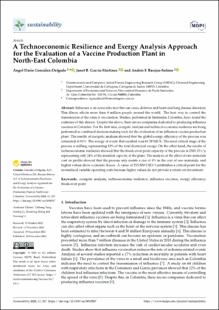A Technoeconomic Resilience and Exergy Analysis Approach for the Evaluation of a Vaccine Production Plant in North-East Colombia
...
González-Delgado, Angel Darío | 2022-12-24
Influenza is an acute infection that can cause diabetes and heart and lung disease disorders.
This illness affects more than 9 million people around the world. The best way to control the
transmission of the virus is vaccination. Studies, performed in Santander, Colombia, have found the
existence of this disease. Despite the above, there are no companies dedicated to producing influenza
vaccines in Colombia. For the first time, exergetic analysis and technical-economic resilience are being
performed as combined decision-making tools for the evaluation of an influenza vaccine production
plant. The results of exergetic analysis showed that the global exergy efficiency of the process was
estimated at 93%. The exergy of waste that resulted was 61.70 MJ/h. The most critical stage of the
process is milling, representing 83% of the total destroyed exergy. On the other hand, the results of
technoeconomic resilience showed that the break-even point capacity of the process is 2503.15 t/y,
representing only 24% of the installed capacity of the plant. The analysis of the effect of raw materials
cost on profits showed that the process only resists a rise of 4% in the cost of raw materials, and
higher values show economic losses. A value of 215,500 USD/t establishes a critical point for the
normalized variable operating costs because higher values do not provide a return on investment.
LEER










